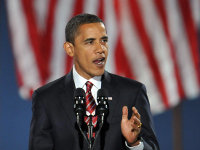Registration
You will receive an email confirming your registration.
IMGXYZ1355IMGZYXThe Obama administration has moved cautiously to reformulate U.S. policy on democracy and human rights promotion. Its announced intention to close the Guantanamo Bay detention facility in an effort to dissociate the United States from some of the more damaging elements of the Bush legacy was a positive signal although implementation has been slower than expected. The central question is whether President Obama’s efforts to reengage with countries such as Russia, Iran, and Cuba can be reconciled with a human rights and democracy agenda.
Carnegie’s Thomas Carothers and Riina Kionka, Personal Representative of the SG/HR on Human Rights at the Council of the European Union, analyzed the Obama administration’s emerging approach to democracy and human rights and its implications for European policy actors. Carnegie’s Fabrice Pothier moderated the discussion.
Highlights included:
- Democracy Policy: Carothers explained that the Obama team is just starting to move ahead on democracy issues and that European governments are just starting to look for ways to cooperate more closely with a U.S. administration they feel more comfortable with. Under the previous U.S. administration, the association of democracy promotion with not only the Iraq war but, more generally, with the use of military force as part of a war on terrorism was seen as objectionable by many. Additionally, the perception of the United States as a symbol of democracy and human rights was damaged by inconsistent U.S. behaviors and practices related to the rule of law and human rights. America’s European allies found their own democracy efforts tainted by the spillover damage from these developments.
- The State of Global Democracy: Complicating matters further for the Obama administration is the troubled state of global democracy, which many believe has stalled or even regressed. In the end of the twentieth century, there was a general perception that democracy was the preferred political system for most countries in the world. However, the Obama administration has inherited a changed context where, in the last five years, this assumption has begun to be questioned. In various parts of the world, the different models of democracy or of democratization itself are now more sharply debated than before.
- The Obama Administration: Carothers remarked that, unlike in the Clinton years, there is currently no senior figure within the Obama administration closely associated with or clearly dedicated to democracy promotion. President Obama himself is wary of committing the United States to transforming foreign political realities. Carothers pointed out that a surprising situation has arisen: the United States now has a president who is an attractive global symbol of democracy, yet that same president is by temperament and intellectual orientation quite cautious about democracy promotion.
- The United States and the EU: Riina Kionka commented that, although Europe and the United States are on the same page ideologically, there is a discrepancy in timing between them. In the United States, democracy promotion was in its hey-day a few years ago. The EU is reaching that level only now. According to Kionka, a greater deal of synchronization between the two is necessary to achieve democratization goals.
